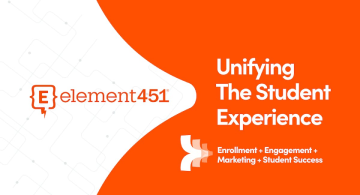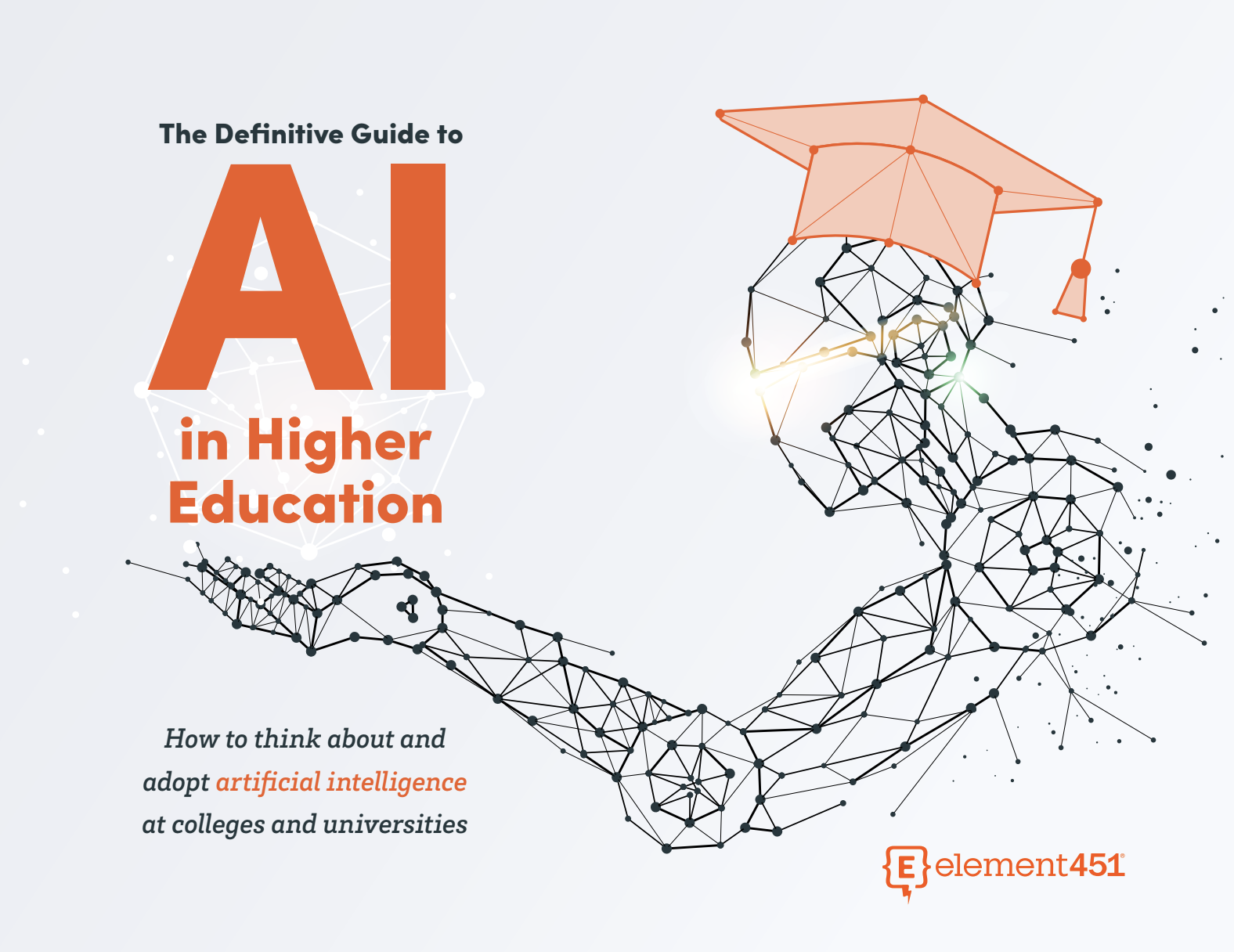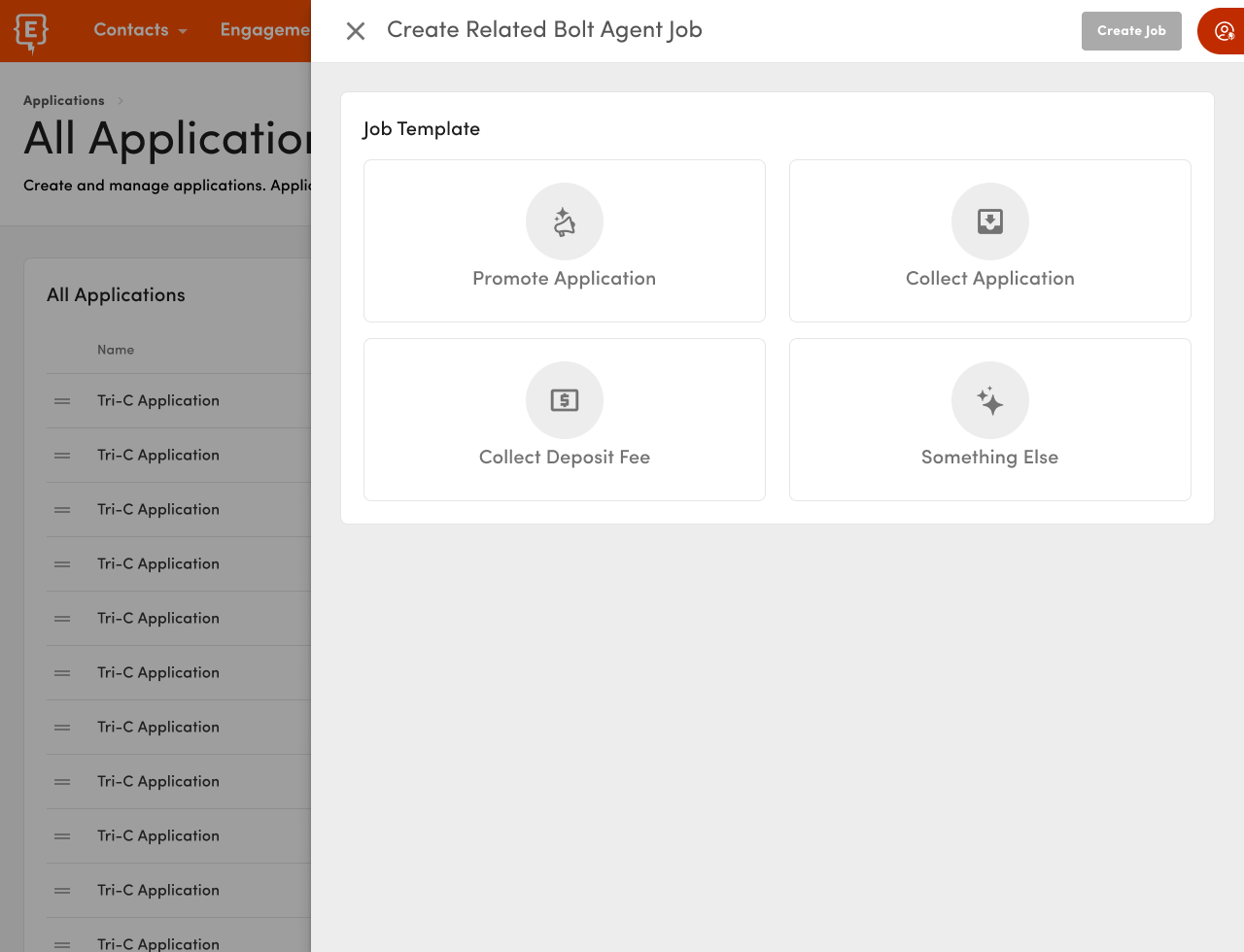Andrew Flagel’s Level Playing Field — Stackable Credits, Outside Partnerships, and A True Digital Transformation
by Sirley Carballo · Updated Feb 09, 2022

Andrew Flagel, President and CEO of the Consortium of Universities of the Washington Metropolitan Area, sits down with host Eric Stoller to chat about the biggest challenges and innovations happening in institutions. Together they discuss:
- The need for partial credit and experience-based education.
- Digital transformation as a means to enhance access and equity.
- What opportunities can partnering with private sector organizations provide?
- What are the next largest issues schools will be confronting?
Listen to Episode 11 of the In Your Element Podcast here.

You can look at models all over the country where folks have broken down barriers and given students back access and flexibility, and it actually raises achievement rates and increases income. So you can do well by doing good.

Full Transcript of Episode 11
Andrew Flagel:
Competency-based evaluations, having credit for work done in the past and experiences in the past actually become more and more logical if you start thinking about it of a goal of keeping people active with your institution for their lifetime. Whether they come back to take more credits, whether they're active alumni, however you look at it. So you can look at models all over the country where folks have broken down barriers and given students back access and flexibility, and it actually raises achievement rates and increases income. So you can do well by doing good.
Eric Stoller:
Welcome to In Your Element, a podcast on the Enrollify podcast network and brought to you by Element 451 and Advanced Student Engagement CRM providing hired institutions with competitive admissions advantage from recruitment to enrollment through the use of AI. On each show, we ask five questions about current challenges, siting opportunities and what's next in higher education. I'm your host, Eric Stoller, and on today's show, Andrew Flagel comes on to talk about how universities can pool their research, their expertise and their data to make the college experience better for students and faculty. Andrew is the president and CEO of the Consortium of Universities of the Washington Metropolitan Area, which is an educational alliance that provides channels for innovation, efficiency and advocacy for its members including Georgetown University, Howard University, and the University of Maryland.
Eric Stoller:
For Andrew, growing up, he always knew he wanted to end up in Washington, although not in higher ed.
Andrew Flagel:
So I thought I'd go into law and politics and be an elected official. And we ran into some challenges with our family business while I was in school. I had some financial insecurity, and it led me to working I think in every possible job that an undergraduate could hold on a campus in order to stay enrolled, and that gave me an opportunity as I was graduating to turn down law school and instead start a position in admissions at the George Washington University much to my parent's dismay. And I fell in love with thinking about that moment when students make the decision about college, college access and transforming access for students. So I started a Master's program there, ended up doing research in college access, and that brought me to the attention of the educational group that ran programs on Capitol Hill.
Eric Stoller:
Andrew spent five years with the Congressional Youth Leadership Council working on transforming diversity in the education system and had access to one of the largest educational databases in the world and started to get a sense of how higher ed systems could work together for the greater good. He then served at the University of Michigan, Flint, George Mason University and Brandeis University before his current role as president and CEO of the Consortium.
Andrew Flagel:
The Consortium really became a hub for thinking creatively about how universities could collaborate when we're sitting in what I really feel strongly is what is America's greatest college town. So...
Eric Stoller:
And you used to live in the Boston area. So those are fighting words.
Andrew Flagel:
Yeah! I think it's interesting that for a lot of reasons, there's a real distinction when you think about Washington and how it thrives on student work and internships on the interaction with programs like the Smithsonian, like the Kennedy Center, like the incredible research that goes on here. You just have a fundamental outlook that's built around an interactive with the universities throughout the region. And they are designed to be more innovative, more interactive, more partnership driven, a little less siloed than I think a lot of the universities in other areas. So it was wonderful to get to come back. I think this, in many ways, is the most amazing group of presidents and provost in the country. The presidents are the board of the Consortium. So I was delighted to take that opportunity, and the past year has really been thinking both in the context of the pandemic and the context of the trajectory of higher education. How can a collaborate of publics, privates across two states and a city state, federal institutions, how can we work more productively together? And what are the other partnerships with government, with industry that can help us transform not just higher education but equitable economic development throughout the region?
Eric Stoller:
Wow. Now, you made me think about should I go and pursue a doctorate at one of these DC schools. I'm thinking now about all the schools that are part of the Consortium, Howard University being a client of Element 451's, and they've been in the news recently as they sort of have done some interesting moves, to say the least, poaching some folks from other schools.
Andrew Flagel:
I would say creatively hiring. I wouldn't necessarily say poaching, but I think Dr. Wayne Frederick is exemplary. He was a chair of the board when I was brought into the Consortium. He's now our immediate past chair. You just can't find someone more brilliant and kinder and more thoughtful about the purpose for higher education, about centering students and centering community in the work that we do. He was a real motivator in decided to accept the position.
Eric Stoller:
That's great. I love that. So speaking of Howard and the other schools in the Consortium, what are the main issues right now for these DC schools? What's top of mind?
Andrew Flagel:
Well, I think all universities are wrestling with how to navigate the recovery from COVID, the continuing rollout of the pandemic and the next phase and at the same time trying to be thoughtful and looking ahead. What are the next largest issues that we're all confronting? I think the model for healthcare, both student, employee and staff healthcare across higher education is at a pivotal moment, the way we collaborate on academic programs is likely to continue to transform. We've seen that all accelerate. I think the trajectory was already there, but the pandemic has been a catalyst for transformation in academic delivery. And then I think the way we interact and promote ourselves and who our audiences are is going to... We all knew that was going to involve, we all had seen the demographic data, but I think the opportunity to be really bold in that thinking has accelerated over the past eight to 12 months.
Eric Stoller:
Hm. Interesting. Obviously growth is important in these institutions, and I'm going to throw a question in here that's not in the usual five. You mentioned The George Washington University, I'll make sure I incorporate the "The". There'd been reports a while back about maybe reducing enrollments as a way to perhaps, I don't think it was necessarily directly tied to quality of instruction or experience but that had been talked about. And then pandemic hit, and that's kind of been reversed. What do you see the trajectory for enrollments for your schools looking like coming out of this pandemic? Are they hurt at all by the pandemic in terms of enrollment, and what does that growth outlook look like?
Andrew Flagel:
So I can tell that as of just last week, and every university will hedge when they talk about enrollment numbers the week before students actually appear.
Eric Stoller:
You're in DC. You have to hedge about stuff, right?
Andrew Flagel:
Right. But the numbers looked incredibly strong coming into this fall semester, which is very, very gratifying, and I think students have had enough being at home. They're excited to be back on our campuses. But we all know what the demographics look like nationally. I think there's an incredible opportunity in the Washington DC region because in some ways the federal government is growing, not contracting. And we have the advent of Amazon HQ2 moving into the region along with the incredible growth of the pandemic and biotech and quantum sectors here that this is a net positive region, a draw for the rest of the country. So our institutions are really thinking boldly about when you talk about growth, what does that mean and who are we missing in terms of diversity, in terms of access? But also, how will this play out over not just the coming months as we come through this pandemic, God willing, but also what it looks like in the next few years.
And I think one of the major takeaways is we gain more regionally in thinking about recruitment regionally, in the advantage of drawing students overall to the Washington region, in thinking about the workforce development regionally, in helping the number of individuals who have partial credit or no credit who are currently underemployed in the region connect with educational pathways. So those are unusual, bold thinking for universities that, over the past decades, have seen themselves as one of the... My young colleagues called us frenemies. I think the reality is that that's just not where we are. These universities will grow and thrive to a much greater extent working collaboratively than working against each other. But I think you're going to see them really grow precipitously, those that have capacity for growth because of that potential that remains here in this region.
Eric Stoller:
Wow. No, it's interesting, this whole idea of they're partners working together and growing together, thriving together rather than maybe sort of competing amongst themselves and what that looks like especially, like you said, regionally speaking.
Andrew Flagel:
So DC is really distinct in that, in that we have had a cross-registration system across the region since the 1960s. So that opportunity to really think collaboratively has always, that potential has been sitting there for a really long time, and I think that was really activated by the challenges that everybody faced this past year and a half.
Eric Stoller:
Yeah, kind of we're all in this together, let's work together. And like you said, the groundwork had been laid with the registration anyway for quite some time. Now, with your organization, with the Consortium, which I joked about earlier kind of off the record and about it being sort of an interesting name for an organization and what it could mean and what it could do, but a Consortium, it seems like, does quite a bit for the schools that it supports, and one of the things that I saw on your website was that you all support innovation amongst your member schools. And I was just curious, a lot of people have been talking with the pandemic that digital transformation that would've maybe happened in five years took place in, I don't know, five months or so. It was really rapidly accelerated. So I was just curious if there's any specific things that the Consortium has done with digital transformation and innovation to sort of spearhead that or enhance or engage its members with.
Andrew Flagel:
Yeah, I think it's interesting because even the terminology "digital transformation" is a fascinating term to me and what we mean by it. I think you have to think not only about our digital transformation in the classroom but in all of the provision of our services to our students and to our pre-students and to our community. So if you think about one, just working regionally on access to broadband, on making sure that individuals on all parts of the region can access our systems equitably. We've done a lot of work collaborating with private industry on that front, but there's also the more intricate work in thinking more boldly about what the financial aid models and financial aid access and scholarship access look like over the next couple of years. And as you've heard, there's all kinds of pieces being batted around models of income, sharing agreements, transformation of a wording of aid and emergency aid. Certainly, that was accelerated during the pandemic, and you have, I mentioned earlier, the transformation of the provision of student and employee and faculty healthcare, the transformation of certainly mental health and getting out ahead of issues of health for your community.
So what I would say is that the discussions are long and deep about where there are opportunities that are scalable because we can do more bold work together whether that be in cyber security or telehealth or in digital transformation in the classroom. And some of that may be with private partners. Some of that means things that we have best practices with in our institutions. University of Maryland partnered with one of their former professors to develop what I think may be the world's leading edge model, a group called Voxy Engine that is one of the best models I've seen for English language learners online. And we're looking at the ways that we can all collaborate with this existing private company that's partnered with the University of Maryland to partner on that model across our organizations. But that's not just teaching students. University of Maryland has made that available to all of their staff so that there are individuals who are English language learners in facilities, in housekeeping, in dining across their massive organization can get free access to these tools.
So what does it look like when you think consortially about that opportunity when you think regionally about it? It gets very exciting. So we have, as one would expect, our board is our presidents. They meet four times a year. Our provost meet four times a year, but we also have a group focused broadly on enrollment and student success and a very innovative group of CFOs and purchasing agents who come together to talk about where are the business intersections across the organization. Increasingly, we're pulling the CIOs into a lot of those meetings because it attracts in these areas. We've got an assessment group that comes together, the registrars group. Interestingly, we also have the police chiefs and the emergency managers who meet together. We've done a lot of work around how we collaborate on emergency management.
So those pieces are... All of them have elements of digital transformation embedded into them. At the same time, yeah, absolutely, our universities have done leading-edge work in bringing their programs online and/or hybrid and how they interface with each other in that capacity is certainly something we continue to work on.
Eric Stoller:
Speaking of, obviously, continuing this thread of digital transformation. Recently, I believe you spoke at this year's ASU GSV, the Global Silicon Valley event, which is kind of one of the main ed tech events out there. What was your main takeaway?
Andrew Flagel:
Well, from my panel, we did a panel on, the hot term's, credit liquidity, which I think is so cute. We used to just call it credit transfer, but credit liquidity and the ability for credit to move, and part of that I thought was a fantastic discussion of really what we mean by it because I think often, when we talk with the public, the idea is all credit should count all the time no matter what, which is completely counterintuitive, right? So if you switch from architecture to nursing, you can bet that some of those credits aren't going to... We want nurses that know how to nurse and architects that know how to architect and not necessarily someone who just gets credit for whatever they've taken.
Andrew Flagel:
So one of the things we talked about on the panel was what we mean is, you shouldn't have to retake credit for things that you already know and have experience in. So how do we do that well? I think first off, we have to define what we mean by credit liquidity for the public because some credit will be lost to career switchers, to pathway changers.
Eric Stoller:
Many people change their major. It's a huge number, and everyone's pre-med at some point, it seems like. You took anatomy and physiology, and then you became an English major. You learn some stuff, though, that's useful.
Andrew Flagel:
Absolutely. And what do we mean by what you have to learn, and how do we build in not just credit liquidity, but also stackibility. How do we create, random, but Steve will say "Credigrees" but how do we build this network of connections that allow you to do pieces of the puzzle that fit into the next part or the next part and really make the adaptable, transformable workforce that we all believe that we're going to need in the future and the critical thinking force that we know we need for our democracy? So the takeaway for me is, our 14th century guild system in higher education is ill-prepared to make credit liquidity and stackibility a reality. And part of that is a set of assumptions by many personnel at universities in gatekeeper positions where they believe with all their heart that, and it gets blamed all the time, Eric, on the faculty. I thought this was fascinating.
The takeaway from our panel is it's rarely the faculty that are the blockers to making these things work well. It is often administrative and financial staff at the university who believe that the financial health of the university is related to not giving credit for other things, not allowing people to bring more credit in, not allowing people to transfer. The less flexibility we have, the more...
Eric Stoller:
Then you have more tuition essentially.
Andrew Flagel:
And I used the example that I gave. I did a panel for a bunch of folks, and a bunch of folks and CFOS and registrars were shaking their heads at me. I said, "Come on, we learned this example as kids watching Miracle on 34th street. The minute Santa started sending people to Gimble's, everybody started coming back to Macy's. If you give them the flexibility, if you're honest with them and flexible with them, students will thrive. They'll be more likely to persist. They'll be happier with your institution. And one of the CFOs said, "You're going to have to show me those numbers."
Eric Stoller:
I mean, if you're truly living the values of your institution, though, and every single institution would say that one of their values is access regardless of rankings or any of that stuff. Then flexibility, when it comes to credits or even the prior learning stuff, that's some interesting angles too on it.
Andrew Flagel:
Yeah. Competency-based evaluations, having credit for work done in the past and experiences in the past actually become more and more logical if you start thinking about it of the goal of keeping people active with your institution for their lifetime whether they come back to take more credits, whether they're active alumni, however you look at it. So you can look at models all over the country where folks have broken down barriers and given students back access and flexibility, and it actually raises achievement rates and increases income. So you can do well by doing good. That was one of my big takeaways.
The other takeaway is there's just so many companies moving so fast, so much venture capital moving back and forth in higher education at this point that I think we're at an incredible inflection moment of the opportunity for the kind of collaborations that the Consortium has, but for even broader collaborations with the private sector where they have the resources and venture capital to do the kinds of innovations that individual universities are going to have a hard time exploring on their own. And partnering with those organizations to think boldly about everything from how we do delivery in the classroom to healthcare, there's a moment here where we can really transform. We've talked for years. We can't get any more efficient. We're built on individual interactions, and that's true, but there's a whole different level of potential efficiency and cost-savings for institutions in some of these scalable products that are being developed and being deployed. So I'm excited about the potential there and interested in how we think about experimenting with these partnerships and evaluating them in really substantial ways.
Eric Stoller:
Well, it's interesting that some of the key takeaways for you from ASU GSV, which I think of as a nerd paradise for ed tech people and it is really more on sort of the student success, utilitarian, let's let everybody bring their stuff in credit-wise and move it around in a much more equitable way. A question I had was sort of, but what role does ed tech play in the future of higher ed plus student engagement? Beyond the credit stuff. I'm thinking more about the interaction piece.
Andrew Flagel:
Yeah, early in my career, I'm much older than you, Eric. So it was the day when we started actually moving registration off of people standing in line with cards, and we moved to doing it on the phone, and now it's so impersonal. And we moved from reaching every student individually as we traveled to doing a lot more phone calling and direct mail. And we use the term that we stole from a lot of other industries, using high tech to get high touch. And I think you got meet your students where they are. We talk about it like it's only Gen Z or Gen Zed that it's the new generation that's so technical, but the reality is, everyone lives their lives on their phones now. Everyone lives their lives on their devices. We have to think about how to make that interaction more sensitive.
So I was meeting with a group today that's doing fascinating work in student mental health built on platforms on apps that are all designed around building community and interaction so that a student who feels isolated, a student who feels alone can reach out anonymously to peers, to other students to connect with them to find mutual support through an app, and they can watch each other and feedback with each other and chat with each other in emotional positive ways. Now, I don't know if that's going to work. It was an interesting model, though, to see it pitched. And so when you start looking at the use of gamification, the use of app and social media platforms on the positive side to very intentionally create a greater sense of connection and community, I think that potential is as yet completely at its nacient point.
I think we're going to see that really explode. We've seen what it looks like when we isolate everybody. We just did an experiment in what isolation looks like, and no one likes it. So the opportunity to say, well, in a world in which we have so much connectivity, how do we use that instead of creating greater polarization, which social media is incredible at, to create greater connection. And I think that we've yet to really tap the potential for that.
Eric Stoller:
Yeah. Well, especially since you're in DC, which is the epicenter of a lot of past moments of polarization, and well, continually moments, I suppose. Kind of a bonus question. Your board, they're made up of leaders of institutions, presidents of all your member institutions. What are some of the top level themes that they're talking about, things they're concerned about, things that they're excited about?
Andrew Flagel:
I love this group of presidents because they're such bold thinkers, and you have a former secretary of health and human services, you have leaders who themselves led medical centers, I have engineers and liberal arts experts, and an incredibly diverse, rich group that respects each other greatly. And their discussion, we have really focused on how can we be stronger together where collaboration allows for our universities to be more supportive of students to gain greater levels of student success but also how can we be more impactful boldly throughout our community. How do you think about equitable economic development regionally and nationally and where are the transformation points that universities should really engage in? Could we be engaged in areas like affordable housing, food insecurity because we have the capacity?
Just this past week, one of our community colleges was one of the largest transition points for Afghani refugees coming back into the country. So the potential of the scale that we have in an organization like this is really quite exciting, and I think that idea that so often, our organizations of colleges and universities are built around government structures, our state system or our community college system, or they're built for a lobbying effort within the state or region. The idea that you're coming together around mission, around service to the community, around service to your students is a real advantage, and there are a couple of other groups like this, The Innovation Alliance that focuses on student success, for instance. So I think you're going to see that accelerate. So I'll push back on a couple of the naysayers in higher education, a couple of our colleagues there that you know have been out there saying, "This is going to be the inflection point now. We're going to start seeing closings left and right. Everyone will shut their doors. It'll be all mergers and acquisitions."
I will say, I was one of the folks who for a long time thought mergers and acquisitions were going to be the biggest boom business in higher ed, and I think instead, it's going to be really bold collaboration. If universities could think about where are the opportunities for synergy in our back office operations, in our student support provisions, how can we even think about combined degree programs? Even at the undergraduate level, accreditation is always fought this, but the idea that you could be doing a bachelor's degree at one place and getting certificates or minors at two or three other places that you're really piecing together the best of a collaboration among institutions. I think we've yet to really realize that potential.
Eric Stoller:
Well, I think in many ways, higher ed is still, like you said, that 14th century model. I mean, thinking about sort of who is going to school, who is attending higher education. You start to talk about certificate programs, like you mentioned, micro-credentials, non-traditional degree programs or workforce development. That expands the overall population in terms of access and credit requirements and dual enrolled students and all that as well as the connectivity with employers. So seems like that's going to be a much bigger thing going forward.
Andrew Flagel:
Yeah. So you asked about my presidents, I think they are collectively focused, though each in different ways on how to achieve those outcomes together, and how do we break down the barriers, what are the pain points that have kept those opportunities from being realized? And is some of it money? Is some it differential tuition? Is some of it structured into the way we do our administration and service models? It's incredible to work with a visionary group of presidents who say yes all the time when they get new ideas, and they want to bring folks in for the discussion. They say yes, but they're very much engaged with the community about, how do we make that into a reality where we're bringing folks along to it, and we're not trying to impose something that breaks the system.
I got to say, I think one of our changes, challenges in ed tech, but also more broadly in higher ed, we use the term disrupter a lot, and higher ed is a delicate balance. We're not prone to disruption the way a lot of I think other industries, they're more on the technical manufacturing side would be. You're talking about a balance whether you're talking about shared governance, whether you're talking about student engagement or alumni involvement. Really, it's a precious bubble that we've created in these incredible... I love... higher ed, I decided to stay in colleges and universities for the rest of my life. I never really wanted to graduate and get out of it. So maintaining what makes it so amazing and yet leveraging the innovation, that balance is I think where you're going to see the reasons that instead of mergers and acquisitions and massive closures, instead, you see a pathway forward in really bold collaboration.
Eric Stoller:
That was Andrew Flagel, president and CEO of the Consortium of Universities of the Washington Metropolitan Area. You can find more on the Consortium at Consortium.org, and you can follow Andrew on Twitter where he's @PrezFlagel, that's P-R-E-Z-F-L-A-G-E-L. Thank you for listening to In Your Element, brought to you by Element451 and part of the Enrollify podcast network. You can find more about the Element 451 student engagement CRM at Element451.com. If you liked what you heard today, please give us a rating and review, and follow along on Apple podcasts, Spotify, or wherever you get your podcasts. I'm Eric Stoller, and we'll see you next time on In Your Element.

Gaining the Recruitment Edge for Community Colleges
Rise above hurdles like declining enrollments, weak tech infrastructure, and budgetary constraints, to reach more prospective students.
Download the White Paper

About Element451
Boost enrollment, improve engagement, and support students with an AI-driven CRM and agent platform built for higher ed. Element451 makes personalization scalable and success repeatable.
Categories
New Blog Posts

The Definitive Guide
AI in Higher Education
Bridge the gap between the latest tech advancements and your institution's success.
Useful Links

Talk With Us
Element451 is an AI-driven CRM and AI agent platform for higher education. Our friendly experts are here to help you explore how Element451 can improve outcomes for your school and students.
Get a Demo







